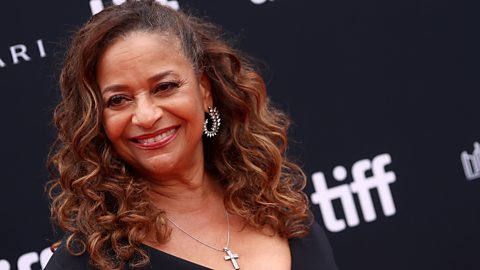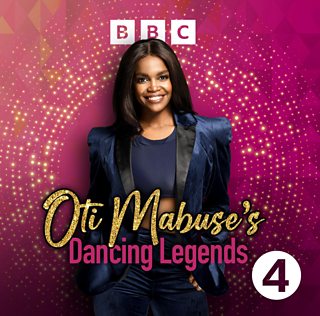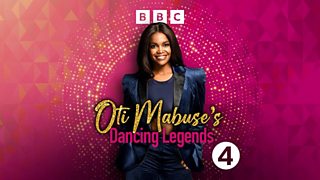The Greatest Dancer's Todrick Hall on Fame's Debbie Allen
In her Βι¶ΉΤΌΕΔ Radio 4 series, Oti Mabuse's Dancing Legends, Strictly pro Oti celebrates the dancers and choreographers, innovators and mould-breakers who have made an impact on the world of dance.
Oti is joined by actor and singer Todrick Hall, to nominate his dancing legend: Debbie Hall – a five-time Emmy-award-winning star whose career has spanned more than four decades. She is known for playing Lydia Grant in the TV series Fame, as well as executive producing, choreographing and establishing a dance academy for the next generation of performers.
With the expert help of dance scholar Dr Takiyah Nur Amin, Todrick and Oti explore the multifaceted career of this legend of the entertainment industry.
Who is Todrick Hall?
Todrick Hall is a dancer, rapper, actor, director, choreographer, and social media personality. The man of many talents rose to prominence on the singing competition American Idol in 2010. For two years he was the choreographer and guest judge on RuPaul's Drag Race. He has starred in Broadway shows including Kinky Boots and Chicago, and performed around the world with his own tours. And, along with Oti, he was a dance captain on the Βι¶ΉΤΌΕΔ Show, The Greatest Dancer.

For his dance legend, he wanted to choose someone who is “a multi-hyphenate and who has done so many things in that field – and before it was easy or cool or accepted or woke to do so.” For him, that person is Debbie Allen.
“She is the entertainment industry,” says Todrick. “She’s not just Broadway, she’s not just television, she’s not just film, she’s not just live, she’s not just a teacher, a choreographer, a showrunner, a director, a producer, a star – she is all of those things encompassed in one.”
Debbie’s early career taught her the power of perseverance
Debbie Allen was born on the 16 January 1950, in Houston, Texas.
As a young person, her life was marked by “a real commitment to perseverance and discipline,” suggests dance scholar Dr Takiyah Nur Amin. “She certainly wasn’t given every opportunity straight out of the gate.”
Debbie auditioned to study at the Houston Ballet Academy but was initially turned away. “Later, faculty from that prestigious academy saw her perform and were so enamoured by her performance that they allowed her into the school,” says Takiyah.
She had a similar experience at North Carolina School of the Arts where she had a “wonderful audition” but wasn’t accepted after being told she didn’t have a “ballet body”. Debbie herself described it as “hurtful” and “devastating” but says her mother’s hard-line approach helped her to keep chasing her dream: “She toughened me up so it’s no surprise that I can take what I have gone through here in this industry and that I’m still here and will continue to persevere because I’ve been through those things as a child.”
Debbie shone in West Side Story on Broadway
Debbie had her Broadway debut in the chorus of the musical Purlie in 1970 and, throughout the 70s, starred in other musicals including Raisin and Ain’t Misbehavin’.
However, it was her role as Anita in the 1980 Broadway revival of West Side Story that got critics raving. “It’s mindboggling that she doesn’t have a Tony Award for that performance,” says Todrick.
Her role in the TV show Fame made Debbie a household name
Her next role, in all-singing, all-dancing film Fame, was her most iconic to date: the dance teacher, Lydia Grant. She only had a small cameo in the movie, but for the TV spin-off – which ran from 1982 to 1987 – the role was reprised. It won her a Golden Globe. “She’s just angelic. She’s just incredible on camera,” says Todrick.
“It’s one of the most important things I ever did,” says Debbie. “The character of Lydia Grant really was a catalyst for so many, many wonderful schools and performing arts academies around the world.”
As well as acting and choreographing on set, Debbie became one of the show’s producers
In her role behind the camera, she made diversity a priority.
“She was the voice of reason to bring diversity into those rooms, to bring diversity into the crew and to the hair and make-up rooms,” says Todrick. “To me, that’s how you change the industry. It’s not even necessarily by the work that you do but the person that you are and the power that you have to open people’s eyes and open the doors for people who would not have normally gotten in.”
Debbie recounts her own experience pushing for more diverse dance pairings: “When I did Fame, I remember the director of photography telling me, ‘You can’t have that black girl dancing with this white boy because I can’t light them.’ I said, ‘Well you’re going to have to learn, my dear, because I’m not gonna change it.’”

"You want fame? Well fame costs. And here is where you start paying for it in sweat."
Debbie Allen's time on Fame.
Debbie has directed and produced for some of the most successful shows on television
Her credits include A Different World, How to Get Away with Murder, Scandal and Jane the Virgin. On Grey’s Anatomy, she’s one of the stars as well as being an executive producer.
In 1997 she was the driving force behind the movie Amistad, a historical drama directed by Stephen Spielberg, based around the revolt onboard a Spanish slave ship.
“This is a black woman who’s been in front of the camera, behind the camera, on the stage,” says Takiyah. “She’s iconic and perhaps not celebrated enough for all that she’s modelled and given to the world of the arts.”
In 2001, she opened the Debbie Allen Dance Academy
The school is open for everyone but their primary focus is on dancers from disenfranchised black and Latino communities, to give them the same opportunities as dancers from other backgrounds.
The academy is best known for its annual Christmas performance: the Hot Chocolate Nutcracker. Their retelling of Tchaikovsky’s classic, using hip hop, pop and Bollywood music, aims to bring ballet to a modern audience.
“I see people of all different shapes and sizes and colours coming to dance at her space,” says Todrick. “She really goes out of her way to make everybody feel welcomed and included.”
“There’s no mistaking that she is making a safe space for people who look like her, because we don’t have that many.”
A long and illustrious career
“She is someone who has really left her mark on the entertainment industry in a way that people wish and dream they could,” states Todrick. And she continues to shape future generations. “She has been able to shift and mould her career. When the world goes digital, she’s gone digital. When it goes from YouTube to Instagram to TikTok she’s right there with it and to me that is somebody who is a force to be reckoned with, not just for now but for always.”
“She is someone who should be revered and adored by anybody who even wants to consider being a part of the entertainment industry. She’s a name everyone should know.”
More from Βι¶ΉΤΌΕΔ Radio 4
-
![]()
Oti Mabuse's Dancing Legends
Professional dancer Oti Mabuse explores the extraordinary people who have changed the course of dance.
-
![]()
One Dish
What's the one dish that holds a special place in your heart? Andi Oliver and her special guests are on a quest to discover the stories and science behind our favourite foods.
-
![]()
Just One Thing
Michael Mosley reveals surprisingly simple top tips that are scientifically proven to change your life.
-
![]()
Add to Playlist
Add to Playlist takes us on a musical journey of discovery, exploring the web of connections between tracks across the breadth of all musical styles.





